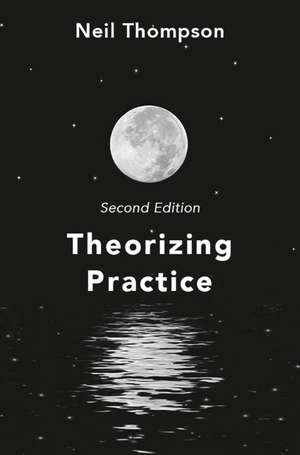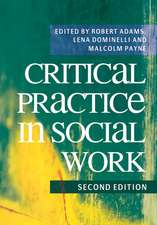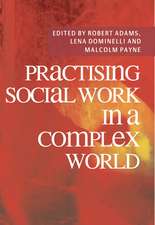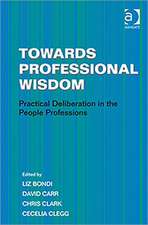Theorizing Practice: A Guide for the People Professions
Autor Neil Thompsonen Limba Engleză Paperback – 22 mar 2017
Preț: 240.23 lei
Preț vechi: 285.56 lei
-16% Nou
Puncte Express: 360
Preț estimativ în valută:
45.99€ • 47.30$ • 38.15£
45.99€ • 47.30$ • 38.15£
Carte disponibilă
Livrare economică 25 ianuarie-08 februarie
Preluare comenzi: 021 569.72.76
Specificații
ISBN-13: 9781137609519
ISBN-10: 1137609516
Pagini: 282
Ilustrații: 1 bw illus
Dimensiuni: 155 x 235 x 18 mm
Greutate: 0.49 kg
Ediția:2nd ed. 2017
Editura: Bloomsbury Publishing
Colecția Red Globe Press
Locul publicării:London, United Kingdom
ISBN-10: 1137609516
Pagini: 282
Ilustrații: 1 bw illus
Dimensiuni: 155 x 235 x 18 mm
Greutate: 0.49 kg
Ediția:2nd ed. 2017
Editura: Bloomsbury Publishing
Colecția Red Globe Press
Locul publicării:London, United Kingdom
Caracteristici
Refreshes thinking: tackles advanced concepts, such as post-modernist and existentialist perspectives, in an accessible and easy-to-read way
Notă biografică
Professor Neil Thompson is a highly respected writer and developer of online learning resources, with nearly 40 years' experience in the people professions. He has held full or honorary professorships at four UK universities and is currently visiting professor at Wrexham Glyndwr University in Wales where he is involved in running the MSc Advanced Practice in the Human Services online programme. He also runs the Avenue Professional Development Programme, an online learning community and tutorial group for people professionals. Connect with Neil online at www.neilthompson.info.
Cuprins
PART I: MAKING SENSE OF THEORY 1. The Role of Theory 2. Theory and Postmodernism 3. Shaping Practice PART II: MAKING SENSE OF PRACTICE 4. The Person 5. Interpersonal Interactions 6. Group Dynamics and Intergroup Relations 7. Cultural Contexts 8. Sociopolitical Structures and Processes 9. The Organizational Context 10. Morality and Ideology PART III: DEVELOPING THEORY 11. Developing Coherence: Drawing on Existentialism 12. The Linguistic Turn 13. Spirituality and Meaning 14. Developing Emancipatory Practice 15. The Challenges We Face










